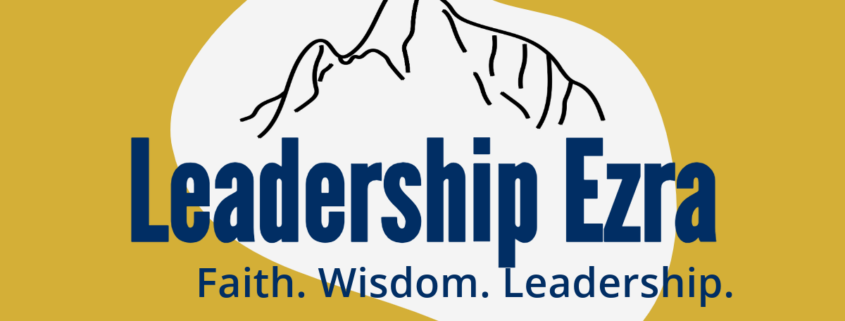Leadership Ezra: Who’s In Charge Here? (Part 4, Get Set!)
In thirty years of life and experience in leadership roles in Christian organizations, there are lessons that I learned (and continue to learn) from the life of ministry to which God called me. Over that time, He taught me lessons based on stories, principles, and truths from the Bible that have been translated into personal application. This series of articles focuses on a set of those lessons drawn from the book of Ezra in the Old Testament (and then published in my latest book). This week (along with last week and next week, and in honor of the upcoming Olympic Games in Paris) we are starting the race of leadership. Today, in part 4, it’s “Get Set!,” where we get into position to start running by first preparing ourselves, both personally and spiritually.
Do you remember your first opportunity to serve in a leadership capacity? I do. I remember feeling like I was not ready but putting on a front to convey the opposite. I was young and had accepted a position as the head of small Christian school. I knew how to teach, because I had been doing so for a number of years. I even knew some things about school administration, because I also had experience in the role of assistant and had developed academic programs. But this time I would be the senior person in charge, fully responsible for the operation of the school. And as excited as I was about the opportunity, when I began the job I felt great uncertainty, unsure of whether or not I was ready to lead well. I was questioning myself, wondering if I had enough knowledge and experience to be prepared.
The book of Ezra provides us with a lesson on leadership preparation, through the illustration of two particular experiences, and they paint a picture of what an effective Christian leader can do to become prepared. The first is in Ezra 7:6-10, and it informs us that Ezra had requested and would be receiving permission and resources from the King, in order to return to Jerusalem. Pay special attention to the last verse in this passage: “For Ezra had prepared his heart to seek the Law of the Lord, and to do it, and to teach statutes and ordinances in Israel.” The second is shared in Ezra 8:21-24, and it describes specifically the preparation for the journey they would take. Here we see that Ezra had gathered his team together and would soon be traveling to Jerusalem with the supplies for the temple. However, before leaving, he stopped to proclaim a fast and to entreat God for the coming task, and then began dividing up responsibilities.
The first passage above provides a picture of the preparation of the person, and the second provides a picture of the preparation for the task. Together, they provide an overall picture of the preparation for leadership, both spiritually and personally. Ultimately, this preparation is applicable to both who we are and to what we do.
The spiritual preparation for effective Christian leadership begins with an understanding of the all-encompassing context of God’s sovereignty and presence. Throughout Ezra, there are examples of God’s intentional activity, and that includes both of these passages. Verses 6 and 9 in chapter 7 both point out that God’s hand was involved in those circumstances, and clearly Ezra realized that concept, because verse 22 in chapter 8 reveals that Ezra had shared that very same truth with the king. The implication that we can draw is clear: spiritual preparation arises out of recognition of God’s sovereignty. By learning to do this, we can begin to see His purpose in all circumstance
Therefore, the first step you must take in preparing yourself to lead, before doing anything else, is to acknowledge God’s sovereign activity, and then submit to Him and to His plans and purpose. Prepare your heart by seeking God (through prayer and through Scripture, as Ezra did in chapter 8), submitting your plans to His grand design, and recognizing His role in your circumstances. Submit to Him for His direction, His blessing, and His instructions. By doing this, you move yourself into the right frame of mind to allow His involvement to shape and filter your actions and your responses. I talked a lot about this in part 2 in this series, God Has A Plan.
Once you have done this inward step, the outward step is your response to God with your ensuing actions, because stepping follows seeing. Having oriented your thinking to God, now it is time to move forward in obedience and start the tasks that you have been given, and that’s where the work of leadership will start. That’s what I’ll be focusing on in part 5. Remember, even with the recognition of God’s role, leadership is not a passive process. It requires intentional planning and action, carried out with skillful practice, but it still must take place within the acknowledged context of God’s activity. In essence, the spiritual process of preparing for leadership is one that is first inward and then outward: first, seeking God and preparing your heart, recognizing His sovereign purpose and involvement, and then second, responding to God’s direction with steps of obedience and action.
In between those two things is something that is crucial to the success of your subsequenct actions. It’s personal preparation for effective leadership that is modeled by Ezra and spelled out in 7:10, which states that his preparation had been “to seek the Law of the Lord, and to do it, and to teach statutes and ordinances in Israel.” This statement describes the simple, yet profound, process of learning, living, and leading (a microcosm of the current series articles, “On Your Mark,” “Get Set,” and “Go”),
- “On Your Mark” (last week’s discussion) – It begins with what we introduced last time, which I call “Learning.” As Ezra showed us, “to seek the law of the Lord,” requires spending time with God and in His Word. It means investing yourself in study of Scripture to learn who God is and what he says. It also means cultivating an intimate, personal relationship with God. For Ezra, it was this knowledge that stemmed from his relationship with God that gave him the capability to lead effectively, because he had taken the time to first spiritually prepare himself. As a result of this, he was able to see and trust God’s involvement, and could therefore act with boldness and confidence.
- “Get Set” – This is the crucial transitional step between the inward and outward pieces that is highlighted in this week’s discsussion. In Ezra’s words, this is “to do it,” the step I would call “Living,” and it requires putting the Word of God into practice in your life. This means consistently and willingly obeying God’s commands, observing and following the truths of His Word. In doing so, you follow God in obedience with your practice, by what you do, and you provide an example of obedience in who you are. For Ezra, his practice and his example gave him the credibility to lead effectively, because he demonstrated consistency and authenticity in his leadership. His walk matched his talk, his life matched his words, so the people believed him and were willing to follow.
- “Go” (next week’s discussion) – This is the outcome of leadership preparation, when the work begins, and is the step I would call “Leading.” In Ezra’s words, this is “to teach statues and ordinances,” and it means that Ezra was now prepared to lead because he was able to teach and explain God’s Word and God’s direction out of his knowledge and relationship with God, and his teaching and direction was believable because of his own life of obedience. He had prepared himself first, and by doing so, had made himself an effective and believable messenger of God, ready to teach, ready to lead, ready to motivate and influence. In the next article, we will break down what those action steps of leadership would be.
It’s that middle step, the personal preparation for leadership, that I am highlighting, and it can be as important as leadership itself. Ezra showed us what it looks like, and the outcome for him was a high level of competence and effectiveness. The methods and process of his personal preparation therefore provides us with valuable tools for our own leadership. And the order that he prescribed for the process is also important. You have to do before you can lead, but you have to know before you can do. So first you have to know it, then you have to do it, then you can teach and lead others.
Ultimately, preparing for leadership involves both spiritual preparation and personal preparation. Effective Christian leadership, therefore, sees God in circumstances, submits humbly to Him, builds a depth of knowledge and relationship, and lives those values consistently, resulting in the preparation to lead well. It is the living out of those values that becomes your starting position in the runners block, so that you are set to start the race when the starter’s pistol is fired.





